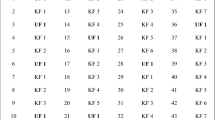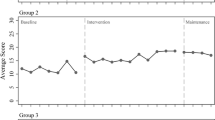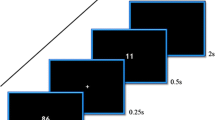Abstract
Reports show that only 40% of 4th-grade students are proficient in math and American students are failing to demonstrate proficiency in key areas of mathematics (National Center for Educational Statistics 2011). Improving students’ fluency of basic math multiplication facts has been recommended as a way to increase math proficiency (Psychology in the Schools, 47:342–353, 2010). Incremental rehearsal is one promising strategy for improving multiplication skills. In this study, three 5th-grade students with disabilities who had Individual Education Plan math goals received one-to-one multiplication instruction using an incremental rehearsal strategy twice per week for 7 weeks. Data indicated immediate and large effects with intervention and growth rates for each student that exceeded expectations. Implications are discussed including the importance of considering both statistically significant and instructionally meaningful results in interpretation.






Similar content being viewed by others
References
Adelman, C. (2006). The toolbox revisited: Paths to degree completion from high school through college. Washington, DC: U.S. Department of Education.
Barlow, D. H., & Hersen, M. (1984). Single case experimental designs: Strategies for studying behavior change (2nd ed.). Boston: Allyn & Bacon.
Burns, M. K. (2004). Empirical analysis of drill ratio rest-arch: Refining the instructional level for drill tasks. Remedial and Special Education, 25(3), 167–175.
Burns, M. K. (2005). Using incremental rehearsal to increase fluency of single-digit multiplication facts with children identified as learning disabled in mathematics computation. Education and Treatment of Children, 28(3), 237–249.
Burns, M. K. (2007). Reading at the instructional level with children identified as learning disabled: Potential implications for response-to-intervention. School Psychology Quarterly, 22, 250–313.
Burns, M. K., & Boice, C. H. (2009). Comparison of the relationship between words retained and intelligence for three instructional strategies among students with low IQ. School Psychology Review, 38, 284–292.
Burns, M. K., Dean, V. J., & Foley, S. (2004). Preteaching unknown key words with incremental rehearsal to improve reading fluency and comprehension with children identified as reading disabled. Journal of School Psychology, 42(4), 303–314.
Burns, M. K., VanDerHeyden, A. M., & Jiban, C. (2006). Assessing the instructional level for mathematics: A comparison of methods. School Psychology Review, 35, 401–418.
Burns, M. K., Hodgson, J., Parker, D. C., & Fremont, K. (2011). Comparison of the effectiveness and efficiency of text previewing and pre-teaching keywords as small-group reading comprehension strategies with middle school students. Literacy Research and Instruction, 50, 241–252.
Burns, M. K., Zaslofsky, A. F., Kanive, R., & Parker, D. C. (2012). Meta-analysis of incremental rehearsal: Using phi coefficients to compare single-case and group designs. Journal of Behavioral Education, 21, 185–202.
Codding, R. S., Archer, J., & Connell, J. (2010). A systematic replication and extension of using incremental rehearsal to improve multiplication skills: An investigation of generalization. Journal of Behavioral Education, 19(1), 93–105.
Cohen, J. (1988). Statistical power analysis for the behavioral sciences. New York: Academic Press.
Deno, S. L., & Mirkin, P. K. (1977). Data-based program modification: A manual. Reston: Council for Exceptional Children.
DuBois, M. R., Volpe, R. J., & Hemphill, E. M. (2014). A randomized trial of a computer-assisted tutoring program targeting letter sound expression via incremental rehearsal. School Psychology Review, 43, 210–221.
Eckert, T. L., Hintze, J. M., & Shapiro, E. S. (1999). Development and refinement of a measure for assessing the acceptability of assessment methods: The assessment rating profile-revised. Canadian Journal of School Psychology, 15(1), 21–42.
Garcia, D., Joseph, L. M., Alber-Morgan, S., & Konrad, M. (2014). Efficiency or oral incremental rehearsal versus written incremental rehearsal on students’ rate, retention, and generalization of spelling words. School Psychology Forum: Research in Practice, 8(2), 113–129.
Hosp, J. L., & Ardoin, S. P. (2008). Assessment for instructional planning. Assessment for Effective Intervention, 33(2), 69–77.
Hosp, M. K., Hosp, J. L., & Howell, K. W. (2016). The ABCs of CBM: A practical guide to curriculum-based measurement (2nd ed.). New York: Guilford.
Iowa Testing Programs. (2012). Iowa assessments. Rolling Meadows: Riverside.
Joseph, L. M. (2006). Incremental rehearsal: A flashcard drill technique for increasing retention of reading words. The Reading Teacher, 59(8), 803–807.
Joseph, L., Eveleigh, E., Konrad, M., Neef, N., & Volpe, R. (2012). Comparison of the efficiency of two flashcard drill methods on children’s reading performance. Journal of Applied School Psychology, 28(4), 317–337.
Kazdin, A. E. (2011). Single case experimental designs: Strategies for studying behavior change (2nd ed.). Boston: Allyn & Bacon.
Kennedy, C. H. (2005). Single-case designs for educational research. Boston: Allyn & Bacon.
Ketterlin-Geller, L. R., Chard, D. J., & Fien, H. (2008). Making connections in mathematics: Conceptual mathematics intervention for low-performing students. Remedial and Special Education, 29, 33–45.
Kratochwill, T. R. (1992). Single-case research design and analysis: An overview. In T. R. Kratochwill& J. R. Levin (Eds.) Single-case research design and analyses: New directions for psychology and education (pp. 1–14). Hillsdale, NJ: Erlbaum.
Kupzyk, S., Daly, E. J., & Andersen, M. N. (2011). A comparison of two flash-card methods for improving sight-word reading. Journal of Applied Behavior Analysis, 44(4), 781–792.
Ma, H. H. (2006). An alternative method for quantitative synthesis of single-subject research: Percentage of data points exceeding the median. Behavior Modification, 30, 598–617.
MacQuarrie, L. L., Tucker, J. A., Burns, M. K., & Hartman, B. (2002). Comparison of retention rates using traditional, drill sandwich, and incremental rehearsal flashcard methods. School Psychology Review, 31, 584–595.
McDougal, J. L., Graney, S. B., Wright, J. A., & Ardoin, S. P. (2010). RTI in practice: A practical guide to implementing effective evidence-based interventions in your school. Hoboken: John Wiley & Sons, Inc..
McGraw-Hill Education. (2007). Everyday math. New York: Author.
National Center for Education Statistics. (2011). The nation’s report card: Mathematics 2011. Washington, DC: National Center for Education Statistics Press.
National Mathematics Advisory Panel. (2008). Foundations for success: The final report of the National Mathematics Advisory Panel. Washington: U.S. Department of Education.
Nist, L., & Joseph, L. M. (2008). Effectiveness and efficiency of flashcard drill instructional methods on urban first-graders’ word recognition, acquisition, maintenance, and generalization. School Psychology Review, 37, 294–308.
Northwest Evaluation Association. (2014). Measures of academic progress. Portland: Author.
Petersen-Brown, S., & Burns, M. K. (2011). Adding a vocabulary component to incremental rehearsal to enhance retention and generalization. School Psychology Quarterly, 26(3), 245–255.
Poncy, B. C., Skinner, C. H., & Axtell, P. K. (2010). An investigation of detect, practice, and repair to remedy math fact deficits in a group of third grade students. Psychology in the Schools, 47(4), 342–353.
Rahn, N. L., Wilson, J., Egan, A., Brandes, D., Kunkel, A., Peterson, M., & McComas, J. (2015). Using incremental rehearsal to teach letter sounds to English language learners. Education & Treatment of Children, 38(1), 71–91.
Renaissance Learning. (2014). STAR math: Technical manual. Wisconsin Rapids: Author.
Shapiro, E. S. (2011). Academic skills problems: Direct assessment and intervention (4th ed.). New York: Guilford.
Skinner, C. H., Belfiore, P. J., Mace, H. W., Williams-Wilson, S., & Johns, G. A. (1997). Altering response topography to increase response efficiency and learning rates. School Psychology Quarterly, 12(1), 54–64.
Skinner, C. H., Pappas, D. N., & Davis, K. A. (2005). Enhancing academic engagement: Providing opportunities for responding and influencing students to choose to respond. Psychology in the Schools, 42(4), 389–403.
Szadokierski, I., & Burns, M. K. (2008). Analogue evaluation of the effects of opportunities to respond and rations of known items within drill rehearsal of Esperanto words. Journal of School Psychology, 46, 593–609.
Tom Snyder Productions. (2011). FASTT math. New York: Scholastic.
United States Department of Education. (1997). Mathematics equal opportunity: White paper prepared for US Secretary of Education Richard Riley. Washington, DC: Author.
Varma, S., & Schleisman, K. B. (2014). The cognitive underpinnings of incremental rehearsal. School Psychology Review, 43, 222–228.
Volpe, R. J., Burns, M. K., DuBois, M., & Zaslofsky, A. F. (2011). Computer-assisted tutoring: Teaching letter sounds to kindergarten students using incremental rehearsal. Psychology in the Schools, 48, 332–342.
Zaslofsky, A. F., Scholin, S. E., Burns, M. K., & Varma, S. (2016). Comparison of opportunities to respond and generation effect as potential causal mechanisms for incremental rehearsal with multiplication combinations. Journal of School Psychology, 55, 71–78.
Author information
Authors and Affiliations
Corresponding author
Ethics declarations
Ethical Approval
All procedures performed in studies involving human participants were in accordance with the ethical standards of the institutional and/or national research committee and with the 1964 Helsinki declaration and its later amendments or comparable ethical standards.
Informed Consent
All data were collected according to APA’s ethical guidelines. Data were collected by the first author, who was working in the schools and delivering the intervention. Because of this and because the data represent standard educational practice which IRB does not define as research, informed consent was not collected formally outside the IEP process.
Conflict of Interest
The authors declare that they have no competing interests.
Rights and permissions
About this article
Cite this article
McVancel, S.M., Missall, K.N. & Bruhn, A.L. Examining Incremental Rehearsal: Multiplication Fluency with Fifth-Grade Students with Math IEP Goals. Contemp School Psychol 22, 220–232 (2018). https://doi.org/10.1007/s40688-018-0178-x
Published:
Issue Date:
DOI: https://doi.org/10.1007/s40688-018-0178-x




